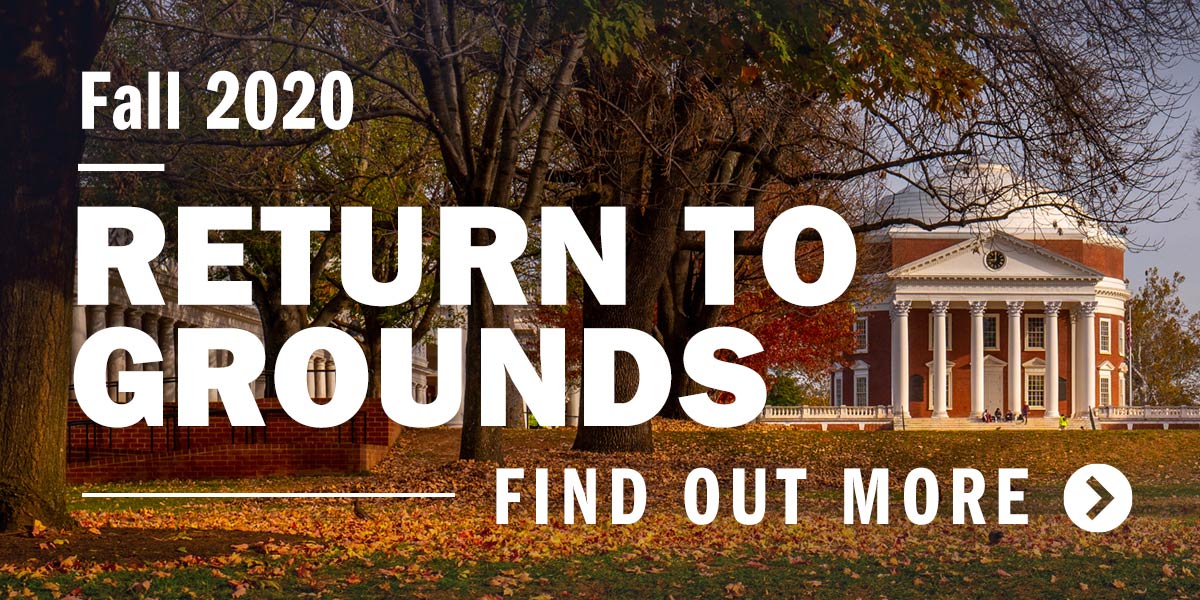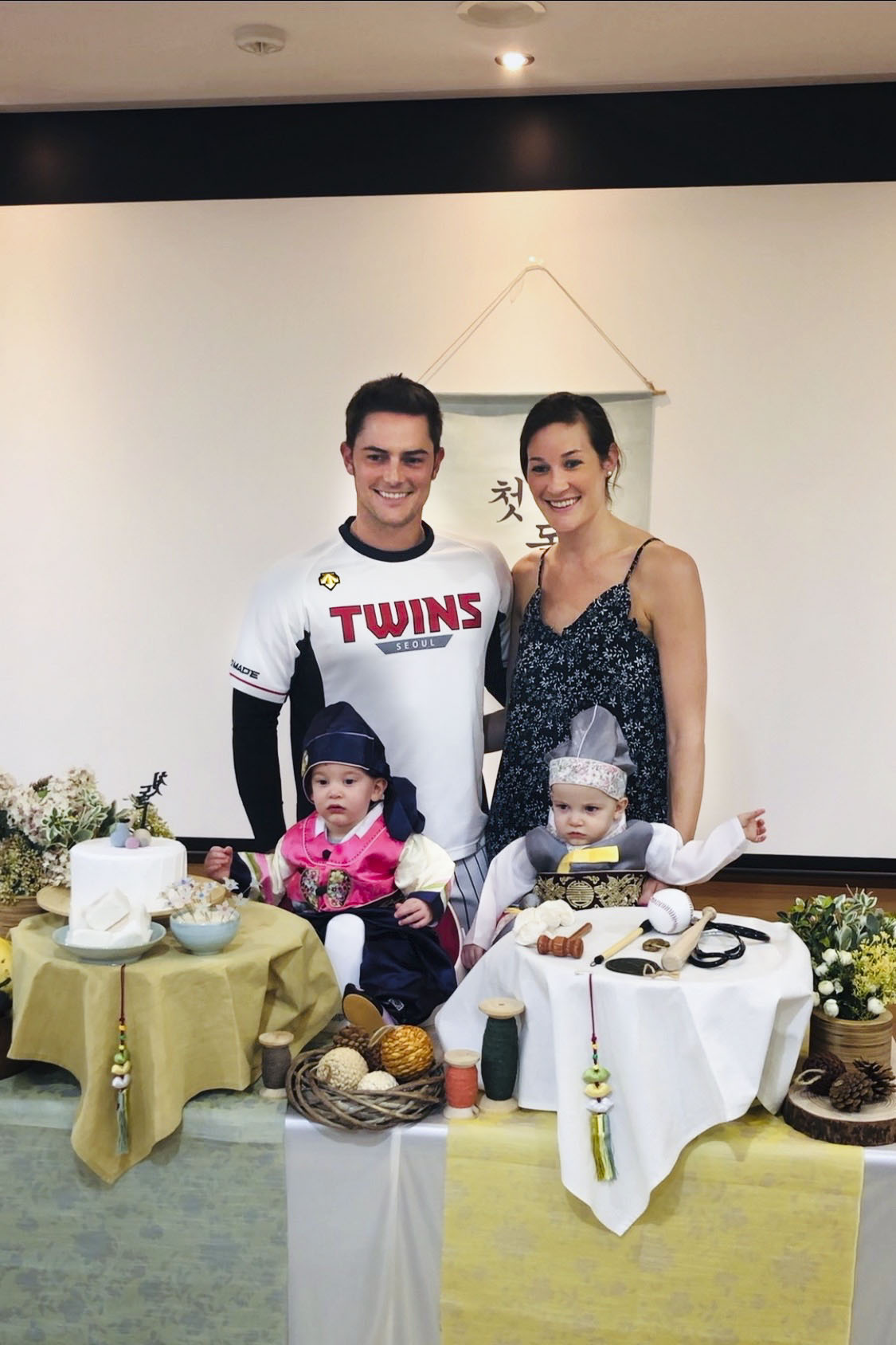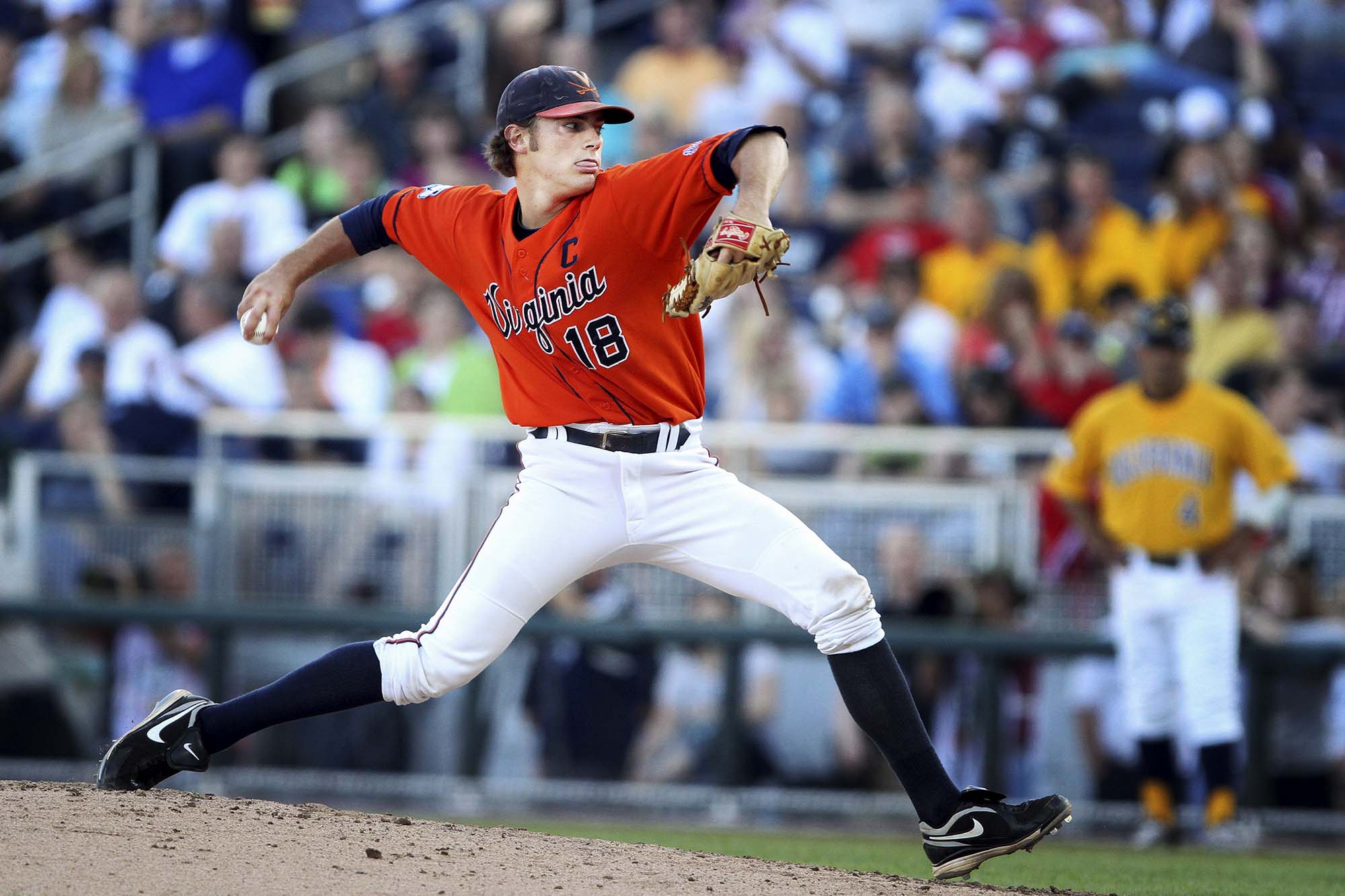Tyler Wilson faced the biggest decision of his professional career.
After more than three years in the minor leagues and then three-plus years shuttling between Major League Baseball’s Baltimore Orioles and its Triple-A affiliate, the former University of Virginia pitcher had two options.
As a free agent, Wilson could sign with any of the 30 major league teams. Or the Lynchburg native – who had an 8-10 career record with the Orioles – could go a less-conventional route and sign with the LG Twins of the Korean Baseball Organization in Seoul.
There were pros and cons to each option for Wilson, who at UVA won the Senior CLASS award, given to the most outstanding senior student-athlete in NCAA Division I baseball.
In the end, Wilson and his wife, former UVA basketball star Chelsea Shine, decided to head abroad.
For the last three years, the couple – who now have twin sons – have spent the majority of their time in South Korea.
UVA Today caught up with Wilson, 30, last week.
Q. How’s this season been going for you?
A. It’s been a wild year. I know it’s been unique for everybody. May 5 was opening day. Prior to that, we started our spring training at the end of January. I went to Sydney, Australia, for three weeks and then went to Okinawa, Japan, for two weeks after that. We were scheduled to be there for about a month, and during that time is when things kind of spiked [due to COVID-19] and the season was officially delayed and we decided to go back to the States. I did that for two weeks in the middle of March, and then things got worse in America and better in Korea, so they sent me back.
When I got back to Korea, I spent two weeks in isolation. I wasn’t allowed to leave my hotel room. Trying to train for a season in a standard hotel room was pretty tough.
When I got out of isolation, we were three weeks out from opening day. Since then, from a baseball perspective, I’ve just been trying to catch up. My body’s starting to feel a little bit better, but it’s just been unique. It’s such a game of routine and structure – to have your preseason totally uprooted … I haven’t done anything like it before, so my body has reacted differently. But it’s OK. Physically, I’m trying to get there and the team’s playing really well. I’m still hoping to try and turn a corner. We’re a third of the way through the year, and it’s just weird feeling like you’re still trying to find your footing, but I’m doing all right.

Family-wise, Chelsea and the boys got here about a month ago. They had to spend two weeks in quarantine after they arrived, but we’ve been back together for about two weeks now.
Q. For people reading this who may not be that familiar with your career and the path you’ve taken since you left UVA, can you explain how you wound up in South Korea?
A. With Major League Baseball, you get three years’ worth of options [which allow a team to send a player to the minor leagues without exposing him to waivers, where he could be claimed by any other team], and in 2017, I was out of them. After those are expired, they either have to keep you in the big leagues permanently or let you go and become available to other teams. It’s kind of the first time you have a say in your professional career. So when I became a free agent and finally had a say … I had always had a desire to play abroad and in Asia, just to experience the other side of the world, thought it was a tremendous opportunity to see what life is like over here.
Chelsea and I talked about it and thought it was the best thing for us at the time. It was a good chance to kind of press reset. The game had been really tough on me emotionally after seven years with the Orioles. It was tough, and I kind of needed a change of pace and to get kind of outside the bubble and kind of be able to look back into what I went through and really process everything.
If I had just signed with another team in the States, who’s to say whether it would have been more of the same – or just totally different. And I’ll never know, but I’m thankful that we made the choice to come here. We’ve absolutely loved it ever since.

Wilson and his wife, Chelsea, celebrating their sons’ birthdays in South Korea. (Contributed photo)
Q. What’s it been like working and living there?
A. It’s a world of difference. When you get between the lines, the rules are the same, but it’s a totally different style of baseball. The level of engagement of the fans is totally different. It is a respect-based culture, so the relationships between players and coaches are significantly different; intra-relationships are different, as far as older guys to younger guys. Age in general is kind of paramount. So there’s just a different hierarchy over here as opposed to the States.
When we got here, we loved it. It was a great reset. I fell back in love with just the structure of the game and I had some predictability for the first time in a long time. We were able to put roots down. We knew this was going to be my apartment, this was going to be my team, there weren’t going to be options every other day, not knowing where you were going to be, waiting-for-the-phone-to-ring-in-the-middle-of-the-night-type stuff.
For the first time, we had some relative foresight of what to expect for the next six months. And we’ve enjoyed that. We could make plans; we could invite family to come and visit. We could make plans for the off day in two weeks to go do something.
It’s been three years now, and we gave birth to our two boys in August of our first year. They were born over here, so it will always have a special place in our heart.
Q. I’ve seen some photos of the kids in South Korean garb. Are there some things your family has really taken to in the culture?
A. I speak a little bit of Korean. I can read it and understand a lot of it.
When the boys turned 1, a fan gave them, it’s called “hanbok garb.” Your first birthday is a huge deal in Korea, and so we had this presentation with these Korean dishes and cakes. They put different objects on a tray and let the kids pick something off of it. They have like a gavel, to be a lawyer, or a coin to be an accountant, or a baseball to be a baseball player. Whatever object you pick is supposed to be what you’re going to be when you grow up. That was a cool thing.
There are other certain little things. When we go back to the States, you might bow sometimes on accident instead of saying “hi” to somebody as you normally would.
Q. Have you written a return to the majors off? If they came calling, would you be receptive, or have you moved on from it?
A. That’s a great question. I think through that a lot – and there are a lot of layers to the answer. I won’t run you through all of them [laughs]. But simply put, right now, this is what’s right for our family. Right now. And, given how the virus has played out, we’ve been able to play a full season and we’ve been able to not worry about salary reductions and losing my job, which I’m extremely grateful for. None of that is lost on me with everything that is going on in the world, but specifically on our home front.
In terms of going back, I can’t give an absolute answer, but the likelihood is no. … I feel like I have to protect my pride a lot of times in answering this question. The world would say, “Yeah, why wouldn’t you go back to the Major Leagues? It has the greatest players in the world. It’s the most respected league. It’s the best of the best.” And that’s absolutely true, and that essence of competition is why we play the game. And I’m grateful for the three years I had to experience that. It was the culmination of a lifelong dream and so many people played a part in helping me get there. … But I’ve done that. I’ve experienced that – and it was emotionally challenging on a lot of different ways. It had ripple effects well into different layers of my life.
In terms of just a total level of contentment and level of joy in what I do for a living and the freedom that I have now to be with my family more consistently, that’s what’s most important. You know, every Monday’s an off day and the travel in this league is significantly less. I get to go to the field an hour or two later and spend so much time with Chelsea and the boys and we get to enjoy this experience as a family, rather than feeling we’re kind of on the edge of our seat at all times not knowing what to expect. … That matters to me more than the feather in my cap saying I went back to America and came full circle.
SoKo just got way cooler https://t.co/o3Kp06oO8I
— Tyler Wilson (윌슨) (@t_willy18) July 14, 2019
Q. Watching from afar everything that was taking place between the Major League Baseball players’ union and the owners as they negotiated a return to play in the midst of the coronavirus – they had a lot of disputes before settling on this new 60-game schedule – did you have any opinions or thoughts?
A. I have lots of opinions [laughing]. One, I’m really happy baseball is back. Whatever it looked like, however it got there, it was what was best for the sport to have some type of product on the field. Or at least the commitment to make an effort.
How it transpired was frustrating to watch – as a fan. You know, I’m not in the MLB anymore. I’m not on those front lines, in those meetings. I don’t know what was said. Do I think it was insensitive to the ongoings of the world and to what people are dealing with on a day-to-day basis and the reality that they were haggling over pennies on their billions of dollars comparatively? As a fan, I wish there would have been more of a cooperative effort. I think there was a middle ground that could have been reached a little easier. I think it was a power grab on both [sides]. I think there was a lot of politicizing going on – way beyond just this immediate getting the product back on the field. I guess I’ll leave it at that – I think it was bigger than just these circumstances. There’s a new [collective bargaining agreement] coming up in the offseason and the waters have been pretty muddied for years now. Even when I was in the States … tensions have been high for a while.
Q. If you were still playing in Major League Baseball, would you feel comfortable playing in this 60-game season?
A. I’m not well-versed on the [safety protocols]. I think the protocol is legitimately 100 pages, and I definitely didn’t read that [laughs]. You know, players have already gotten [COVID-19], and there are only going to be more of them who get it. I’ll be interested to see how they handle it.
I think personally, I don’t know that I would abstain from playing. It’s obviously a difficult time in our world, but I’m fortunately not considered high-risk and I don’t have immediate family who could potentially be affected by it. I would obviously steer clear of my parents or in-laws. But I would play. But I would fully understand why some people might not.
Q. It sounds like fans, for the most part, at least initially, won’t be allowed to attend major league games. You’ve had that experience this season in the KBO. What’s that been like?
A. It’s been interesting. Initially, it took some getting used to. I hadn’t done that in a long time. Even in high school, there are a couple people there.
Those first preseason games, there was nobody in the stands – there was media and that was it. So you could hear everything – side conversations going on in the dugout; you could hear the broadcaster in the booth, everything that was going on. Once the season started, they had the cheerleaders and the band back in the stadium – so there was tons of white noise going on at all times. So that kind of took the edge off of it.
But I would say after the first week, I didn’t even notice a difference. When I’m pitching, I never notice anyways. I think the fans play an integral role at pivotal points in games. Baseball is kind of hinged around a couple situations – like you score runs at certain points in the game. And when the crowd recognizes, “OK, it’s bases loaded and one out in the sixth or seventh,” like this is a big moment and the crowd takes it to the next level and you as a player recognize that.
Now, without the fans present to do that for you, you have to really recognize those moments that really dictate the outcome of a game and take your game to the next level without any assistance. So it’s unique. But it’s not as different as I thought it was going to be.
Q. Have you thought how much longer you want to play, and after your career is over, what you might want to get into?
A. This is my 10th year, and this is the first year where I’ve really felt, “How do guys play well into their 30s or even their 40s?” I think some people are just really fortunate to stay healthy their entire career and some guys are just blessed and have amazing God-given talent that transcends decades. But 10 years is a lot longer than I ever thought I’d play in the first place. I’m grateful I’ve been in the game this long and have learned what I have from it.
This is the first time in my career where I feel like my body is pushing back on me a little. That’s been hard. That’s been frustrating – to feel like you’re not what I used to be. So I’m processing that a lot. I’ve felt it for the last couple years. I’m good enough to compete. I’m just not who I used to be. You have to find different ways to get people out and evolve and pitch differently – so that’s a challenge.
In terms of after baseball, I don’t know. At UVA, I was pre-med. I always felt if baseball didn’t work out, I’d go to med school. Fortunately, baseball has played out for 10 years. I think the ship has sailed in terms of medical school, just in terms of time commitment and now we have a family. The “what” we’ll do – I can tell you the where we’ll do it. We’ll be in Charlottesville for certain, and that will be the driving force on what I do. I care about the community. I care about the University. We just built a house there and I want to do something that gives back to the community, something that’s part of the community and really lay down roots and get to know the people that really make the place so special and that we love.
Q. Looking back on your time at UVA, what are some of your fondest memories?
A. Baseball-wise, I loved it – my teammates and coaches, what we accomplished as a program. My favorite baseball memory ever is when we walked off [the University of California]-Irvine in the Super Regionals to go to Omaha. I can tell that story every day. I felt like that encapsulated the program in a way that that people can’t comprehend. It was resilience. It was toughness. It was competition. It was all of the pillars – it was accountability, it was team. It was everything that the program stood for – in one inning. That’s what makes it so special. I feel like I could write a book on that one inning.
Off the field, I formed so many special relationships, and, just in general, what University provided me … obviously my bride [smiling], the greatest gift I have in this world, but just the friends and the community beyond just the team. The University and Charlottesville are just special. The way that people come together and everything is so intimately tight-knit is the thing I’m forever thankful for.
Media Contact
Article Information
July 6, 2020
/content/qa-former-cavalier-pitcher-finds-happiness-south-korea

